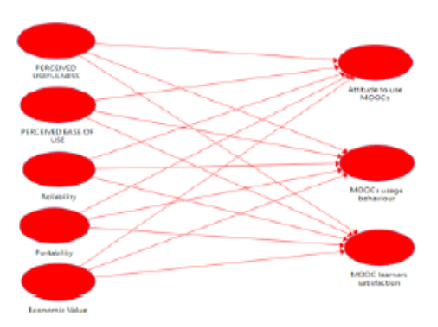


Indian Journal of Science and Technology
Year: 2023, Volume: 16, Issue: 8, Pages: 590-597
Original Article
V Priyadarshini1, M Shuaib Ahmed1*, R Sathya2, D Koteeswari3, S Ragothaman3
1Assistant Professor, School of Management, C. Abdul Hakeem College of Engineering & Technology, India
2Assistant Professor, Department of MBA, Kingston Engineering College, Tamil Nadu, India
3Assistant Professor, Department of MBA, Sri Balaji Chockalingam Engineering College, India
*Corresponding Author
Email: [email protected]
Received Date:27 October 2022, Accepted Date:16 January 2023, Published Date:02 March 2023
Objectives: Higher education learners paid attention to MOOCs in their relevant fields to enhance their skills and knowledge. The purpose of the current study is to find the MOOCs’ disruptive technological dimensions of learners’ attitudes, learners’ usage behavior, and learners’ satisfaction. Methodology: The current study adopted a descriptive research design, it is a cross-sectional study, with 384 MOOCs learners included in a questionnaire survey during the months of June to August 2022 in the Tamil Nadu. For Data analysis, Frequency statistics, the Kruskal Wallis test, and PLS-SEM were employed. Findings: Kruskal Wallis test revealed that there is no mean significant difference between gender, education stream, MOOC preference, and MOOC course mode on attitude to use MOOC, usage behavior, and learners’ satisfaction. PLS-SEM results revealed that there exists a positive significant relationship between the dimensions of disruptive technology (perceived usefulness, perceived ease of use, reliability, portability, and economic value) on the attitude, usage behavior, and learners’ satisfaction. However, there is no significant relationship (t- statistics with 0.783) found between the perceived ease of use dimension of disruptive technology on user behavior. Managerial implications: MOOC service providers need to concentrate on DT dimensions, which affect users’ attitudes, usage behavior, and satisfaction. Novelty: The current study introduces the disruptive technological dimensions with the existing TAM model, it helps Edtech companies, higher education institutions and MOOC service providers to understand the learners’ usage behavior and the expectations of disruptive technology elements in MOOCs. The DT dimensions introduced in the present study will have adopted by future researchers to make the relationship between the emerging DTs and user satisfaction in the different segments and markets.
Keywords: Disruptive technology; Higher education; MOOCs; Online learning; Behaviour
© 2023 Priyadarshini et al. This is an open-access article distributed under the terms of the Creative Commons Attribution License, which permits unrestricted use, distribution, and reproduction in any medium, provided the original author and source are credited. Published By Indian Society for Education and Environment (iSee)
Subscribe now for latest articles and news.